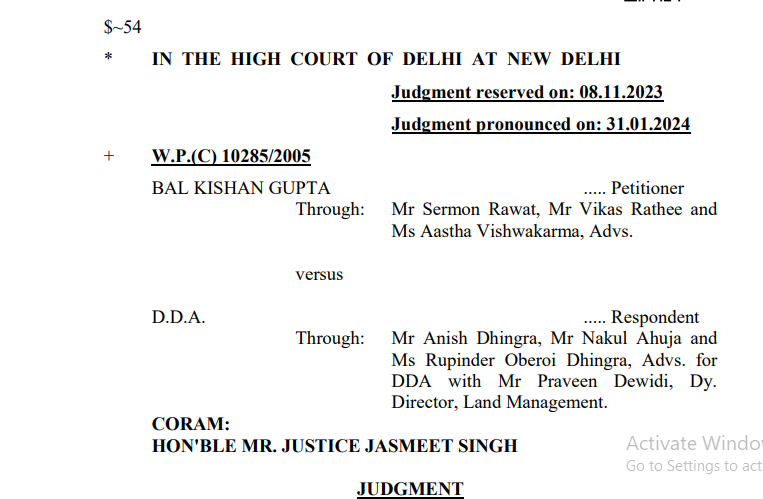“Delhi High Court’s Procedural Fairness Ruling”
Table of Contents
Introduction
In a recent ruling, the Delhi High Court underscored the imperative for the Delhi Development Authority (DDA) to adhere to principles of natural justice in its actions, particularly regarding property demolitions. This ruling stemmed from a plea filed by Bal Kishan Gupta challenging the DDA’s attempt to demolish his property in Karol Bagh.
Background of the Case
Bal Kishan Gupta, possessing a registered sale deed, argued that the DDA had failed to provide him with an adequate opportunity to present his case before initiating demolition proceedings. In contrast, the DDA contended that Gupta was an unauthorized occupant on government land without any legal right to the property.
Legal Arguments and Counterarguments
The court delved into the conflicting claims, focusing on the lack of procedural fairness in the DDA’s actions. Gupta’s rights to natural justice were purportedly violated, as he was not provided with a show cause notice or an opportunity to respond before demolition proceedings commenced.
Court’s Examination of Evidence
The court scrutinized the evidence presented by both parties, particularly the ownership of the land. Despite the DDA’s claim that the property was on government land, there was a lack of conclusive evidence supporting this assertion.
Violation of Principles of Natural Justice
Justice Singh highlighted the significance of procedural fairness, emphasizing that the DDA’s actions lacked adherence to principles of natural justice. The absence of due process undermined the integrity of the DDA’s actions and infringed upon Gupta’s rights.
Lack of Conclusive Evidence
The court observed a lack of conclusive evidence regarding the ownership of the land, prompting further examination of the matter.
Court’s Ruling and Relief Granted
Justice Singh granted relief to Gupta, restraining the DDA from demolishing his property without following due process. This ruling underscored the importance of upholding principles of natural justice in administrative actions.
Significance of the Ruling
The ruling serves as a reminder of the judiciary’s role in safeguarding individual rights against arbitrary actions by government authorities. Upholding procedural fairness ensures the protection of fundamental rights even in the face of governmental authority.
Conclusion
The Delhi High Court’s ruling in the Bal Kishan Gupta case represents a significant milestone in jurisprudence concerning administrative actions and the protection of individual rights. By emphasizing the importance of procedural fairness, the court reaffirmed its commitment to upholding principles of justice and fairness in a democratic society.









